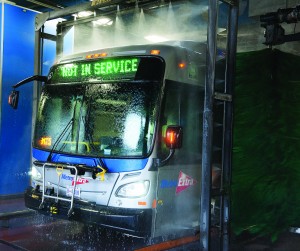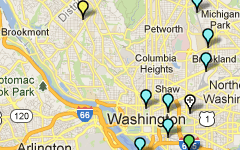Water Use at Metro
Fresh water is a precious resource and Metro is doing its part to reduce strain on shared natural resources and infrastructure. The Authority uses water for a whole host of activities beyond drinking and flushing. Water is used to maintain our facilities, keep stations cool, to wash buses and trains, and to clean vehicle parts. To give Metro’s water use some sense of scale, in 2013 the Authority used 98 million gallons of water, or the equivalent of 148 Olympic-sized swimming pools.
Metro has already made significant investments to conserve water throughout the Authority. For example, all of Metro’s new and renovated bus garages feature bus wash systems that incorporate high efficiency water saving equipment. Wash water is no longer just fed from the utility and mixed with detergents. Instead, during the wash cycle the mix is drained off, transferred to large sumps and then pumped through reclaiming modules of gratings and filters that clean the water that is then reused in the following wash cycles. The bus wash system automatically calibrates not only water usage but detergent application amounts; saving on detergent use as well. The use of high efficient bus wash systems reduces the amount of potable water Metro uses and the amount of wastewater Metro generates.
Also, all new Metro facility construction and major retrofits are Leadership in Energy and Environmental Design (LEED) certified and feature low-flow water fixture upgrades. Low-flow fixtures use high pressure and aeration to produce an acceptable flow without using as much water.
Future facilities, including Metro’s Cinder Bed Road Bus Operations and Maintenance Facility – anticipated to be completed in 2016 – will be designed to LEED specifications and will feature many of the sustainable design features including the efficient bus wash system and low-flow fixtures.
To expand water conservation in the future the Authority has set a target to reduce our potable water use per vehicle mile by 20% by 2025.
This post forms part of a series featuring content from Metro’s Sustainability Agenda, part of Metro’s Sustainability Initiative.



Recent Comments